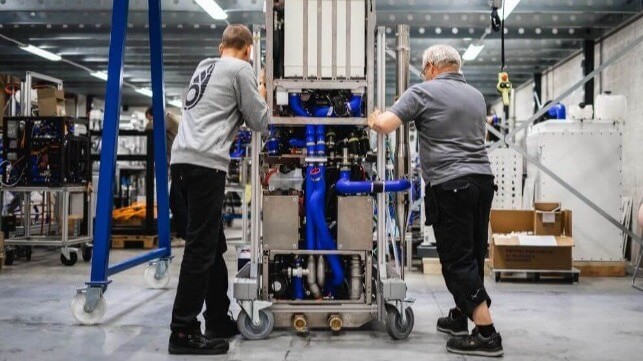PowerCell Tests First Methanol-to-Hydrogen Fuel Cell Power System

Hydrogen fuel cell supplier PowerCell and methanol-to-hydrogen reformer builder e1 Marine have finished a shoreside "string test" by connecting up their respective equipment to create a 200kW H2-powered propulsion system. The resulting system of systems takes methanol in and puts out electrical power at the far end, without an internal combustion engine. CO2 and water are the only emissions.
The test is a technology trial for the future inland pushboat MV Hydrogen One, which will be built around an all-fuel-cell propulsion system. The system is the first of its kind, according to PowerCell, and could be used for workboats, push-boats and superyachts. It will be deployed aboard MV Hydrogen One beginning next year, according to owner Maritime Partners LLC.
The sponsors believe that methanol-to-hydrogen will be a practical solution because methanol is easier to handle than compressed or liquid hydrogen gas. Hydrogen requires complex systems for onboard storage and transfer, which affects the vessel's overall design; methanol is a common commodity, and its requirements for use as a marine fuel are comparatively simple and well-known.

that matters most
Get the latest maritime news delivered to your inbox daily.
PowerCell Group has pioneered megawatt-scale fuel cell systems for the maritime sector, which are fully marinized for shipboard installation. It believes that fuel cell power is one of the most effective means of using green methanol, produced from renewable energy, to power a low-emissions ship.
“The successful completion of these tests gives future ship owners, integrators and methanol suppliers the confidence they need in this powerful combination of technologies. Fuel cells are some of the most efficient ways to extract energy from fuel, and we are deploying them at a scale never seen before," said Richard Berkling, CEO at PowerCell Group. "This can be seen in our project with Torghatten Nord, where we will supply 12.8 MW fuel cells on Norway’s longest ferry route – the largest maritime project to date."
